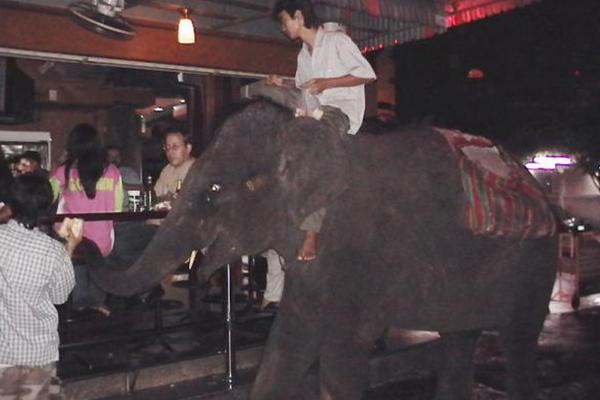Traditions - Street Begging Elephants

The use of elephants to beg on the streets of major cities in Southeast Asia (particularly in Thailand and India) poses a serious problem for the welfare of these animals.
Street elephants are forced by their owners to live and work in an urban environment: the mahout earns money by forcing them to perform tricks or by offering passers-by bananas and other fruits to feed the animals in exchange for money.
The main "audience" of the "begging" elephants are western tourists who are understandably captivated by the sight of a wild animal in a city environment and are willing to spend some money to be able to interact with the elephants. Most of them, however, are unaware of the serious problems involved in these activities.
Where do these animals come from?
Historically, Asian elephants had been used in the logging industry, ironically, helping to destroy the habitat they need to survive. After the logging ban in 1989, most of the animals have ended up being used for the tourism industry or for begging on the streets of big cities like Bangkok. Some of these animals belong to families that used to use them in the timber industry and have been forced to reuse them in this activity to make a living; others are hunted in the wild and bought by wealthy entrepreneurs who then sublet them to people with fewer resources, and who in many cases do not have enough knowledge to manage these wild animals.
Elephants are forced to walk the busy streets late at night, usually starting around 4 pm, that is, when it is still very hot. During the day they are usually kept in precarious conditions and without the proper shelter from the sun. As many elephant owners live on the outskirts, they and the animals may have to walk several kilometers every day on the hot and dangerous roads to reach the city centers.
The streets are often dirty and congested, which leads elephants to struggle with their breathing and becoming victims of traffic accidents: in 2002, the Thai government minister declared that up to 20 elephants a month are involved in such accidents. The city also hides many other dangers for animals used to living in a natural environment: in 1987, an elephant named Boon Choo fell into an open sewer in Bangkok and died.
The hard and hot pavements of the streets severely affect their feet, which are very delicate and require attention in captivity. In addition, elephants need large quantities of fresh vegetables and clean water, not having access to these resources in the cities.
Loud music, crowds, fear, stress, disorientation, and the chemicals often given to these animals to keep them calm, destabilize them psychologically.
Finally, we cannot forget that all the elephants employed in this industry have to be "domesticated" by means of the Pajaan, a cruel technique whose name translated literally means "breaking their soul".
In Thailand, begging with elephants has been banned by law since 2009, but elephant owners still risk possible fines. Despite the local government's attempts to enforce the law, the mahouts hide the elephants and move them around constantly in different areas of the city. Police officers often have no idea how to deal with a four-ton elephant, and it is often easier for authorities to turn a blind eye than to deal with the problem. To be truly effective, any solution should be integral and complete, and not rely on occasional raids. It is essential to provide elephant keepers with alternative means of earning a living and an incentive should be provided for mahouts to remove their elephants from the streets.
Meanwhile, it is imperative that tourists who encounter "begging" elephants refrain from giving money to the mahouts: this type of behavior, although well-intentioned, only serves to perpetuate the problem.
Various organizations such as EleAid, Wildlife Friends of Thailand, and EARS work hard to raise awareness regarding these issues and to rescue elephants used in this industry.
